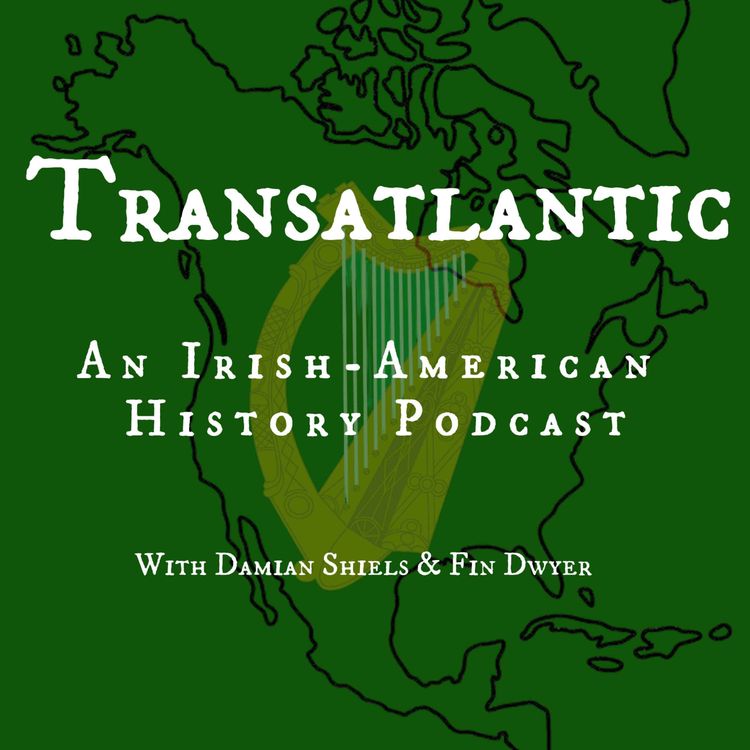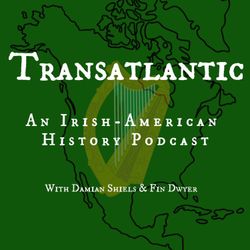Share

Transatlantic: An Irish American History Podcast
8. Mother Jones: The Most Dangerous Woman in America?
In this episode, Fin and Damian explore the life of one of the most renowned Irish American women in history: Mother Jones. Known as a fearless labour organiser at the turn of the 20th century, she played a pivotal role in the often violent struggles between workers and employers. Her very name instilled fear in the authorities, with one prosecutor famously calling her "the most dangerous woman in America."
Mother Jones's backstory is equally fascinating.
In this intriguing episode, Fin and Damian take you back to early 19th-century Cork, where she survived the Famine. They then follow her story after she emigrated to the US where she endured personal tragedy. Despite these challenges, she rose to become a leading figure in the American labour movement in the early 20th century. Remarkably active into her 70s and 80s, her fascinating story is summed up in her catchphrase: “Mourn the dead, and fight like hell for the living."
Buckle up for one of the most incredible stories from Irish American history!
Subscribe to Transatlantic https://linktr.ee/transatlanticpod
Get in Touch with Fin and Damian Transatlanticseries (at) gmail.com
More episodes
View all episodes

37. American Emigrants in Irish Folklore
47:48|Irish folklore often recalls an ancient past. However, in this episode Fin and Damian explore how America and the experiences of Irish emigrants had already become part of folklore by the early twentieth century. Set down almost 100 years ago, among the stories you will hear tales of ghosts that reflect a sense of loss and remembrance of emigrants, examples of how returned emigrants were sometimes seen as "other", and even find out about how Irish children had already become fascinated by the American West and Native Americans.Folklore Archive www.duchas.ieSeymour, S. True Irish ghost stories https://archive.org/details/trueirishghostst0000seym_s6t9Tait, C Spectres Across the Atlantic, c.1820-1940: Communicating with the Dead Over Space and Time https://www.tandfonline.com/doi/full/10.1080/14780038.2023.2258606Interview with Clodagh Tait acast.com/irishhistory/episodes/a-history-of-the-supernatural-in-ireland&ved=2ahUKEwjOxZbyoLCSAxWRW0EAHeZIC9sQFnoECDcQAQ&usg=AOvVaw3kmEFkBqKv1hnVAg6DtN7B
36. From Famine to the Frontline: The Irish in the US Civil War
55:34|The American Civil War was a defining moment for Irish Americans in the 1860s. Over 250,000 Irish Americans many of them Famine emigrants served in the Union army. Over the course of the war they played a key role in the defeat of the Confederacy.However their service has been dogged by stereotypes and myth for more than 160 years. In this episode Damian discusses his latest research published in his 2025 book Green and Blue. Fin and Damian explore the book that brings new perspectives to our understanding of the war. They examine the immense Irish contribution to the Union cause and what their experiences of the conflict were really like. They also address the darker aspects of Irish involvement. Damian explains how and why Irish attitudes to emancipation and racism were not what we might expect from a community that served the Union in such overwhelming numbers.Damian’s book “Green and Blue Irish Americans in the Union Military, 1861–1865” is a must read for anyone interested in the civil war of Irish America more broadly Get your copy https://www.amazon.com/Green-Blue-Americans-Conflicting-Dimensions/dp/0807183709
35. Catholicism & the Irish in California: Indomitable Sacramento
01:03:22|How did Catholicism develop on America's West Coast during the 19th and 20th centuries, and how did it differ from the experience in the major Eastern cities? What role did Irish Americans Catholics, both women and men, play in the pioneering years of the Golden State's gold rush and the development of California's state capital over the century that followed? These are just some of the questions we explore in our latest episode of Transatlantic: An Irish American History Podcast, taking as our lens the Irish men and women who helped to build, develop and sustain the city of Sacramento. We are joined to discuss this by leading historian of Catholicism in America Father Steven Avella, formerly Professor of History at Marquette University in Wisconsin. Father Avella has written a number of volumes on the history of Sacramento and Catholicism in the city, including Sacramento: Indomitable City, Sacramento and the Catholic Church: Shaping a Catholic CIty and Indomitable Sacramentans: A Social History of Catholics in the State Capital. Father Steven M. Avella Books
34. Tammany Hall: The Irish Political Machine in New York
55:58|In this episode of Transatlantic: An Irish American History Podcast, we’re joined by noted historian Dr. Terry Golway to explore the story of Tammany Hall, the famed New York political machine so long associated with Irish America. In this show you will hear about Tammany's origins, how and when it became a powerful force for Irish immigrants, and how the famed machine operated through its long existence. Today, even the word "Tammany" is seen as a byword for corruption and excess. But is there more to Tammany’s story than scandal? Terry helps us to explore this, revealing how Ireland's politics influenced the development of Tammany's operations, and exploring Tammany's often overlooked positive contributions—demonstrating how this a story that is much more than just Boss Tweed and rampant corruption.Notes & Sources:Terry Golway. Machine Made: Tammany Hall and the Creation of Modern American Politics. Terry Golway Books
33. Ben Franklin's Forgotten Trip to Ireland
45:56|In 1771 Benjamin Franklin spent more than six weeks traveling through Ireland at a moment when tensions between Britain and her colonies were rising. In this episode Damian and Fin trace his route from Dublin through the Irish countryside and explore the people he met and the conditions he witnessed. Despite being laid low with food poisoning on his first day he quickly became absorbed in what he saw. The poverty of rural Ireland the restrictions placed on Irish trade and the political frustrations of the Protestant elite all left a deep impression on him. These experiences helped shape the ideas he carried back to America and influenced his thinking in the years before the Revolution.Further Reading Carla Mulford, Benjamin Franklin and the Ends of EmpireJames B. Nolan, Benjamin Franklin: In Scotland and Ireland 1759 and 1771
32. Irish Mountain Men: Pioneers of the American West?
51:43|One of the most enduring stereotypes of early US history is the Mountain Man. This figure often appears as the tough and resourceful frontiersman familiar from films like The Revenant. The stereotype is rooted in fact and in recent months Damian has been researching the Irish men who found themselves in the American West during the early nineteenth century. Fin and Damian explore this history along with who these men were and what brought them into the Rocky Mountains. They also look at how they interacted with Native American tribes in the region.
31. Clare to Connecticut: One Family’s Escape from the Great Hunger
51:54|What can a micro-history of emigration, the story of a single townland, or even a single family, reveal about the wider Irish emigrant experience? In this episode, we trace the remarkable journey of the Clune family of Tyredagh Upper, Co. Clare, whose multigenerational migration to Norwalk, Connecticut offers insight into how local origins shaped settlement patterns in America.We’re joined by Dr. Jane Halloran, historian, genealogist, and founder of Dalcassian Origins, to discuss her research on this chain migration and the powerful community networks that carried families like the Clunes across the Atlantic. Through their story, we uncover how one family’s path could influence patterns of migration from Ireland, and shed light on the wider 19th and early 20th century Irish emigrant experience.Further Reading Dr Jane Halloran Dalcassian Origins: http://www.dalcassianorigins.com/Tyderagh Upper: https://www.townlands.ie/clare/tulla-upper/tulla/newgrove/tyredagh-upper/Norwalk Connecticut: https://www.townlands.ie/clare/tulla-upper/tulla/newgrove/tyredagh-upper/
30. Phelan & Collender: The Irishmen Who Built an American Billiards Empire
24:13|Michael Phelan, born in Castlecomer, Co. Kilkenny, rose to prominence as one of America's most gifted billiards player and showmen. In New York he encountered Hugh Collender, from Cappoquin, Co. Waterford, an exiled Irish nationalist who decided to turn his talents to business after the failed rising of 1848.Phelan’s flair and Collender’s enterprise combined into one of the great economic successes of 19th century Irish America. Together they built Phelan & Collender, a company that revolutionised billiard-table manufacture and helped define an American leisure industry. This episode traces how two Irishmen, shaped by different beginnings but united by drive and ingenuity--and eventually by close family ties--carved out a partnership and business empire that became a household name in Gilded Age America.
29. The Irish in Wisconsin
48:50|Wisconsin isn't the first state that springs to mind when it comes to the Irish American Diaspora. But though often more associated with Germans (and German beer!), Wisconsin had a notable Irish presence. Today, Milwaukee is even home to Irish Fest, the largest Irish festival in the United States. In this episode, we’re joined by Professor Tim McMahon of Marquette University to uncover the fascinating history of the Irish communities who made Wisconsin their home.We chart their stroy from the early arrivals of the nineteenth century to their lasting influence in the twentieth, tracing how Irish immigrants shaped places like Milwaukee — building neighborhoods, parishes, and a distinct Irish-American identity in the heart of the Midwest.We explore dramatic moments like the tragic Lady Elgin disaster- a maritime catastrophe for both Wisconsin and the Milwaukee Irish- and the later political and cultural connections maintained with Ireland. Tim also discusses Éamon de Valera’s visit, and the story behind that iconic photograph of De Valera in a Native American headdress.Dr Tim McMahon: https://www.marquette.edu/history/directory/timothy-mcmahon.phpMilwaukee Irish Fest: https://irishfest.com/